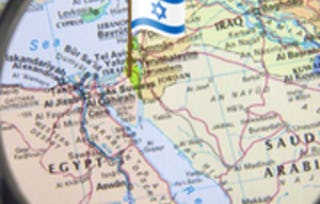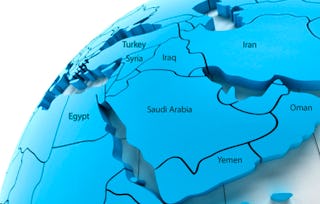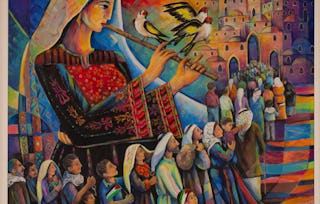Israel is a country that draws a lot of public attention around the globe. Nevertheless, both those who support Israel and those who are critical of its geopolitical standing and policies, usually have a very limited knowledge about the Israeli society and its political system. This course presents Israel from multiple perspectives - political, social, economic and cultural - in an attempt to expose the learners to a cutting edge academic research on the country.

Israel State and Society

381 reviews
Skills you'll gain
Details to know

Add to your LinkedIn profile
14 assignments
See how employees at top companies are mastering in-demand skills

There are 14 modules in this course
Israel is a country that draws a lot of public attention around the globe. Nevertheless, both those who support Israel and those who are critical of its geopolitical standing and policies, usually have a very limited knowledge about the Israeli society and its political system. This course presents Israel from multiple perspectives - political, social, economic and cultural - in an attempt to expose the learners to a cutting edge academic research on the country. Each of the 13 sessions is focused on one aspect of the Israeli society. Every session starts with a general introduction of the issue at hand, hosting one expert or more, who share their most recent studies and insights on that specific field. Every 15 minutes, or so, the students are asked to answer an informative quiz of comprised of a single question. Upon the completion of each class, an online chat will be opened.
What's included
1 video2 readings1 assignment
The state of Israel was established in 1948, as the nation state of the Jewish people. Yet, many of its current features can be traced back to the Jewish religious longing to return to Zion (or Jerusalem), and to the national political movement known as Zionism. In our first lesson we go back to the origins of the Zionist ideology and the political institutions it generated and examine how they have shaped Israeli society over the years with a special interest in the Zionist vision of Theodor Herzl.
What's included
1 video2 readings1 assignment
Zionism has brought together Jews from different countries, all over the world; Jews who have lived in this territory for generations, and the Arab inhabitants of the land. These groups have differed in their history, national narratives, and vision for the future of the country. They spoke different languages, and told their children different stories about the things that connect them to the land. This class tells the story of the nation building process and the (partially) successful quest to construct a national identity in this divided society.
What's included
1 video1 reading1 assignment
This session presents the different groups comprising the Israeli society, and the changes in their composition over time. It also presents what had been considered the "demographic problem," and the reasons for the country's high fertility rates.
What's included
1 video1 reading1 assignment
The Israeli political system reflects the country’s complex social mosaic and contested history. This class provides the foundation for a better understanding of Israel's political system and its institutions.
What's included
1 video1 reading1 assignment
This session will offer a brief historical overview of Israel's place in the Middle East. It tries to highlight the main dynamics, which keep feeding the Jewish-Arab conflict.
What's included
1 video1 reading1 assignment
The lecture addresses the appellation "Jewish and Democratic State" from a variety of perspectives and disciplines: historical, political, philosophical, and theological ones. A special focus is place on the way gender outplays in the country, given its Jewish nature.
What's included
1 video1 reading1 assignment
Arab-Palestinian citizens constitute the largest national minority in Israel. Despite the formal and legal integration into the Israeli society of the Arab residents, security concerns and doubts regarding their loyalty to the new state, have shaped the complex relationships between the Arab minority, the Jewish majority, and the state, throughout the years. This class discusses the history of the Arab minority in Israel and its contemporary state
What's included
1 video1 reading1 assignment
Israel is a society of immigrants. It was shaped by waves of Jewish immigration beginning in the late 19th century. At first, most if the immigrants arrived from Eastern and central Europe. After the founding of the state, however, waves of immigrants from the Middle East and North Africa have transformed Israel's social and cultural fabric. In the following decades, new waves of immigration from Ethiopia and the former Soviet Union have continued to add to the social complexity of Jewish society. This class will address the internal cleavages within the Jewish majority in Israel, their socio-economic consequences and the state’s attempts to bridge cultural differences, and close the occupational and educational gaps between the groups. We will specifically focus on how one of those groups - the immigrants from North Africa, have culturally coped with the marginalization they have experienced in Israel through Saints' Impresarios.
What's included
1 video1 reading1 assignment
The military in Israel plays a crucial role in the country's politics, economy and society, due to its engagement in an ongoing armed conflict. Military service is universal for Jewish men and women. It is often the front door to the local labor market, allowing the upward mobility of some, and the exclusion of others. This lesson will examine the role of the IDF in shaping the Israeli society from two complementary perspectives: the role of the army in shaping gender identities; and its place in the production, reproduction and transformation of the social (ethnic and national) hierarchies.
What's included
1 video1 reading1 assignment
This session will present Israel's economy and its transformation from statist centralized economy to a neo-liberal one organized around its leading high-tech industry. It will explore the social consequences of this process in terms of growing inequality and recent social protest.
What's included
1 video1 reading1 assignment
This session will address the question of voting in a society so riddled with external and internal conflicts, and in a political system offering so many options,: "how does the Israeli voter decide?" It will provide both sociological and psychological models of electoral behavior, examining the roles of social cleavages and political communication in determining votes.
What's included
1 video1 reading1 assignment
As a young society of immigrants and natives, the development of a relatively coherent and identifiable Israeli identity and culture seemed almost impossible. Yet, many Israelis and foreign commentators argue that such a distinct identity has indeed been created. In this lesson we will explore the swift evolution of an Israeli identity and culture. We will ask what are the origins of this identity and which groups are included (and which groups are marginalized) in its construction. We will consider the possibility that the Israeli culture revolves around cultural traumas associated both with the Holocaust and also, more deeply, with the Jewish predicament of persecution and exile. An analysis that sees Zionism as the solution for the existential fear that is associated with this collective trauma. We will also talk about trauma and its effects in contemporary politics.
What's included
1 video1 reading1 assignment
Jerusalem is among the most contested cities in the world, characterized by an unremitting struggle for territorial control—neighborhood by neighborhood and even house-by-house. Juxtaposing the city history and its complex Geography, this class will tell the story of Jerusalem as a microcosms of the Israeli society and its place in the middle-east.
What's included
1 video1 assignment
Instructor

Offered by
Explore more from Governance and Society
 Status: Preview
Status: Preview Status: Preview
Status: PreviewTel Aviv University
 Status: Preview
Status: PreviewTel Aviv University
 Status: Free
Status: FreeUtrecht University
Why people choose Coursera for their career

Felipe M.

Jennifer J.

Larry W.

Chaitanya A.
Learner reviews
- 5 stars
80.83%
- 4 stars
12.33%
- 3 stars
4.46%
- 2 stars
0.52%
- 1 star
1.83%
Showing 3 of 381
Reviewed on Jan 15, 2022
Course not updated politically as of year 2022, GCC arab countries signed diplomatic relation contracts with Israel
Reviewed on Jun 30, 2019
well and thorough explanations of important topics that allows us to understand Israel State and Society.I also didn't find the course biased which is a good thing.
Reviewed on Mar 24, 2017
Well made and really amazed by the effort of objectivity done by the teachers

Open new doors with Coursera Plus
Unlimited access to 10,000+ world-class courses, hands-on projects, and job-ready certificate programs - all included in your subscription
Advance your career with an online degree
Earn a degree from world-class universities - 100% online
Join over 3,400 global companies that choose Coursera for Business
Upskill your employees to excel in the digital economy
Frequently asked questions
To access the course materials, assignments and to earn a Certificate, you will need to purchase the Certificate experience when you enroll in a course. You can try a Free Trial instead, or apply for Financial Aid. The course may offer 'Full Course, No Certificate' instead. This option lets you see all course materials, submit required assessments, and get a final grade. This also means that you will not be able to purchase a Certificate experience.
When you purchase a Certificate you get access to all course materials, including graded assignments. Upon completing the course, your electronic Certificate will be added to your Accomplishments page - from there, you can print your Certificate or add it to your LinkedIn profile.
Yes. In select learning programs, you can apply for financial aid or a scholarship if you can’t afford the enrollment fee. If fin aid or scholarship is available for your learning program selection, you’ll find a link to apply on the description page.
More questions
Financial aid available,

